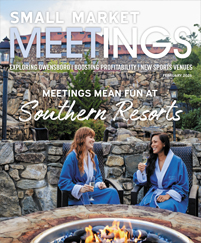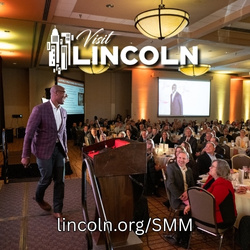When Susan Jackson was hired at the Beaumont Convention and Visitors Bureau in 2010, there were people who had already been volunteering for the Texas CVB for 15 years.
“We have annual events that request volunteers who were there the year before,” said Jackson, convention servicing manager for the Beaumont CVB. “We have volunteers that almost become part of the event.”
Not all CVBs maintain a volunteer program, but those that do have another tool to offer planners: free help from their own in-house corps of volunteers.
“I’m a big supporter of working with CVBs and utilizing the resources available to us from CVBs,” and that includes volunteers, said Saira Banu Kianes, owner and president of Banu Event Solutions and Training.
Using volunteers offsets labor costs for meetings, but volunteers also contribute to events in less monetizable ways, like having local people on hand who are knowledgeable about the destination and passionate about promoting their community.
CVB Volunteer Programs
Not all CVB volunteer programs work the same way. Under the traditional model, a CVB maintains a roster of volunteers, like in Beaumont, which currently has about 20 regular volunteers. Beaumont’s volunteer program is based on room nights; volunteer help is available free of cost for events with 150 or more room nights. If an event has fewer than 150 room nights, it’s on a case-by-case basis, Jackson said.
In Chattanooga, Tennessee, the Chattanooga Convention and Visitors Bureau is developing a program for individual volunteers that is one of the agency’s strategic priorities for the fiscal year, said Tim Morgan, president of the Chattanooga Sports Committee, a division of the Chattanooga CVB.
The CVB once had that type of volunteer program but realigned its approach to use volunteer groups that have fundraising initiatives, such as ROTC units, church youth groups, bands, science and technology clubs, fraternities and sororities.
If the group provides a certain number of volunteers and completes the needed tasks, the CVB gives them a grant. It’s a win-win-win, Morgan said. The volunteer group can use the work for teambuilding, skill building and earning money. The event organizer gets complimentary labor, which helps keep down costs. And the CVB uses the volunteer program as a way to educate people about sports tourism and its economic impact.
“It’s a community advocacy tool for us,” Morgan said. “It helps local organizations understand who we are and what we’re doing — and also why we’re doing it.”
Call in the Corps
Volunteers oftentimes help by assisting with registration or staffing an information table to field questions from attendees.
“When our volunteers are there, they are answering basic questions about the nearest gas station, a good local place to eat, where to buy a phone charger,” Jackson said. “It alleviates the work on the registration committee, and from a planner standpoint, it helps them focus on the conference.”
Volunteers can also stuff swag bags or put together packets. Other courtesy services may include greeting guests or acting as a step-on guide during a city tour or a shuttle ride.
“They are local and can answer questions, versus just bringing in someone who doesn’t know the group or the area,” she said.
Kianes assisted with a recent 850-person corporate event at the Gaylord Texan Resort and Convention Center in Grapevine, Texas. The CVB there provided the event 20 hours of complimentary volunteer staffing. Event organizers used volunteers to direct traffic, handle signage and help with packing and setting up the office. They also helped set up about 15 breakout rooms with tent cards and other items.
“Whatever was given to them, they were on it,” Kianes said. “They were so willing to help. When they would finish with one responsibility, they would come back and ask what else they could do.”
In Chattanooga, volunteers often help with registration for sporting events as well as setup and teardown, such as installing volleyball courts, but “it depends on the event need,” Morgan said. For example, when the city welcomes the 2020 NCAA Division II Softball World Series in May, the CVB will use volunteers as community ambassadors for the teams while they’re in town for the tournament.
To make the most of volunteer staffing, planners should be thoughtful and specific about when to bring in volunteers, and planners should negotiate different shifts, Kianes said. Instead of having everybody at the same time on the same day to set up, maybe one volunteer is available to help out between breakouts or to give the planner a break before the evening social event starts.
‘Not Hired Help’
Using volunteers presents its own challenges, however, and “planners should always remember that they are volunteers,” Kianes said. “They don’t have to be there. Volunteers are not paid. I cannot repeat that enough: They’re not hired help.”
That means planners have to be careful about their expectations for volunteers and what they ask of them. Though Kianes doesn’t ask their specific ages, she always makes sure to ask what volunteers are physically willing to do and what they have done in the past.
When using volunteer groups, as Chattanooga does, Morgan stressed that organizers should thoroughly vet the volunteers and make sure the terms are mutually beneficial. Otherwise, it could end up being detrimental for the event.
Many of Beaumont’s dedicated volunteers are retirees, and not all of them are able — or willing — to do every type of work. Jackson strives to know her volunteers; some may be more comfortable behind the scenes putting together gift bags and packets, while others who are more outgoing thrive at the information table or as step-on guides.
In addition to personality, physicality is also important. Jackson caps volunteer shifts at four hours, makes sure there’s a place for them to sit, ensures that they get breaks, provides Dri-Fit polo shirts if they’re working outside, doesn’t ask them to do hard labor and won’t let them handle money.
“It’s about getting to know everybody’s abilities and making sure they’re comfortable,” Jackson said.
Every time Jackson sets up servicing with a conference chair, she tries to promote Beaumont’s volunteers; but she also questions planners in detail about what they expect volunteers to do and how their time will be used.
“Do you expect them to sit there? Or stand and hand out pamphlets? Or guide people, too? That helps me pick the right person for the job.”












